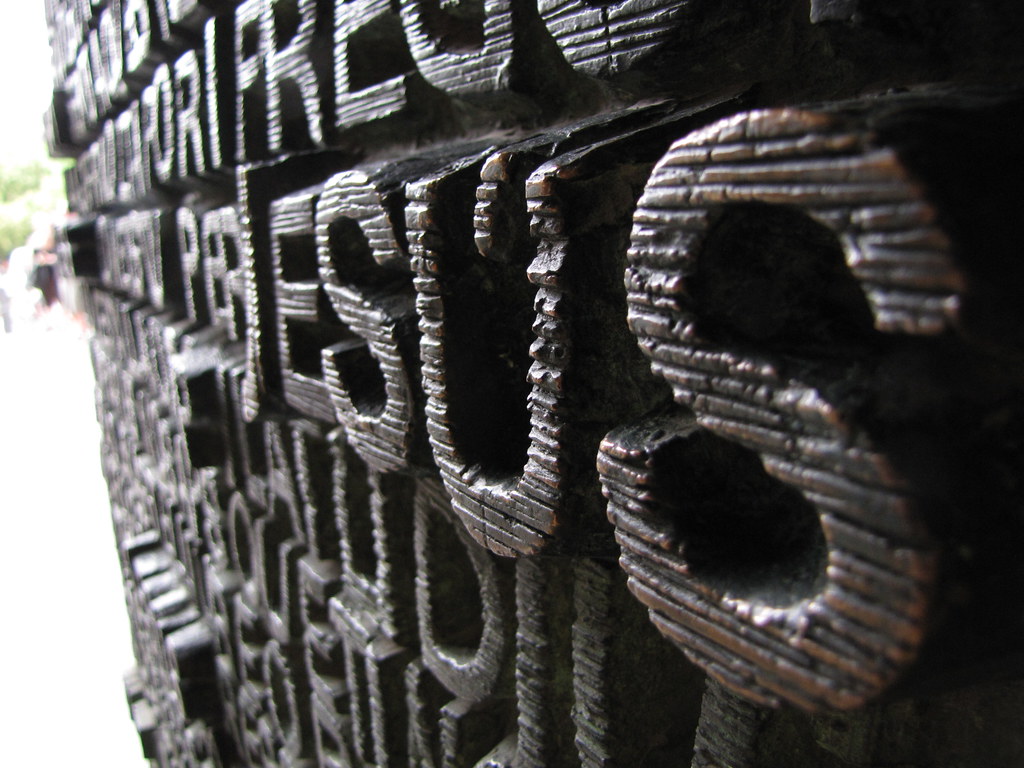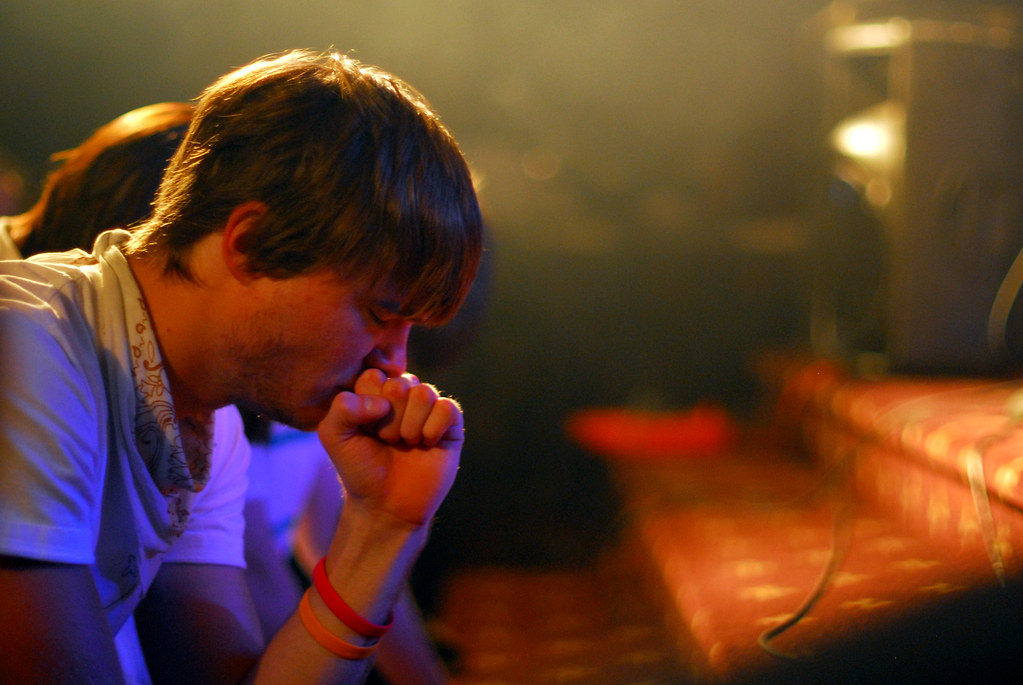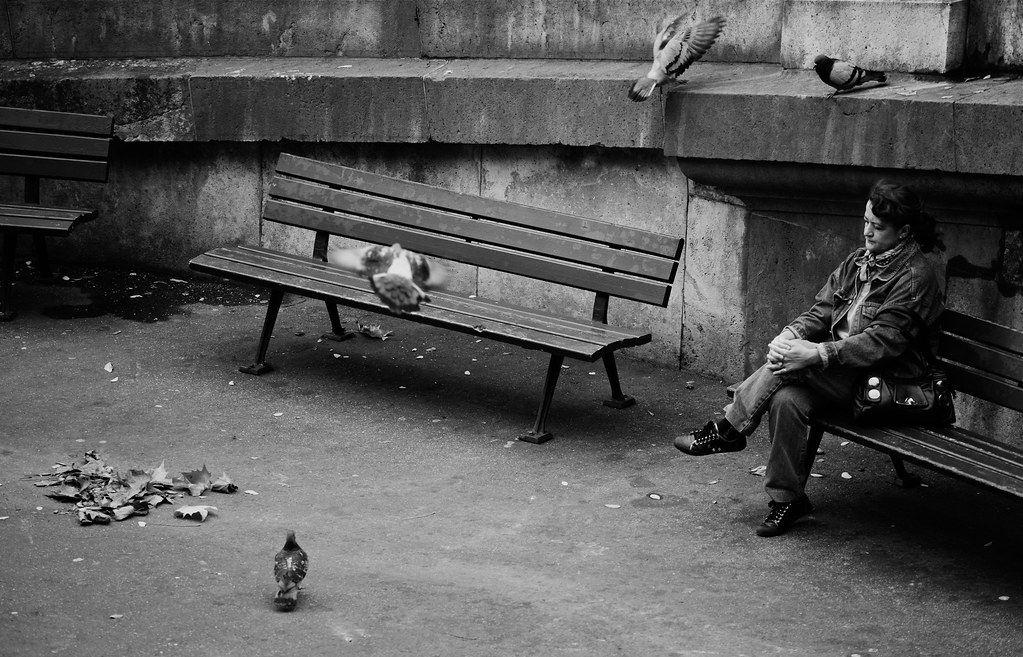Remember 'Remember the Titans'?
Culture change is tough - but it is worth it!!! I was reminded of this as I watched the movie Remember the Titans. A coach dropped into a chaotic situation must bring culture change for the team to survive... but he doesn't just want it to survive he wants it to succeed, and to dominate. In a way we want our ministries to do likewise so what ideas for culture change can we take from Coach Boon?

Thinking about sacrifice
If Jesus is King, what does that mean for what we want to do with out lives? [Image by Chris Bellerophon Dotson on flickr]

Back to the Mission
Reminded again and again about what we are created for. We are created for worship! But because there are some people who do not worship, we have been given a mission... to go and show people they were created to worship! - photo on Flickr by llamatofu

Appeasement verses Satisfaction
Do we look to appease our emotions, troubles, discomforts with earthy things that may provide some release temporarily, or do we look to God who is the source of complete satisfaction? [Image by donald_palansky_photography on flickr]

Sunday 31 March 2013
Resurrection Sunday
Enjoy.
Saturday 30 March 2013
Easterfest
I have enjoyed some of the bands, but this weekend away has reminded me once again of the importance of relationship.
Friday 29 March 2013
Thursday 28 March 2013
The Cross of Christ @ Easter (Part 6)
Sanctification; it is a big word, but in its simplest idea means 'the process of becoming more like Christ'. Since Jesus was perfect then sanctification is working towards perfection. Perfection is something we will never grasp on earth as a human, but our faith continues a work of sanctification in us - which will be completed when we meet Jesus face to face and are given our eternal (new creation) body (because from then there will be no more sin, pain or imperfection at all).
"...the cross is the means of our sanctification. This is where the three other crucifixions come in. We have been crucified with Christ (Gal 2:20). We have crucified our fallen nature (Gal 5:24). And the world has been crucified to us, as we have been to the world (Gal 6:14). So the cross means more than the crucifixion of Jesus; it includes our crucifixion, the crucifixion of our flesh and of the world."I hope you have enjoyed this little work up to Easter. The Cross of Christ is an incredible book which I cannot recommend highly enough. These six posts have been just a small taste of the covering and theological depth given to a look at what we celebrate and remember this Easter weekend.
John Stott; The Cross of Christ, p 405
The Cross of Christ @ Easter (Part 5)
"The first thing that has to be said about the biblical gospel of reconciliation, however, is that it begins with reconciliation to God, and continues with a reconciled community in Christ. Reconciliation is not a term the Bible uses to describe 'coming to terms with oneself', although it does insist that it is only through losing ourselves in love for God and neighbour that we truly find ourselves.
Reconciliation with God, then, is the beginning. This is the meaning of 'atonement'. It alludes to the event through which God and human beings, previously alienated from one another, are made 'at one' again... Thus, reconciliation, peace with God, adoption into his family and access into his presence all bear witness to the same new relationship into which God has brought us.
But reconciliation has a horizontal as well as a vertical plane. For God has reconciled us to one another in his new community, as well as to himself."
John Stott; The Cross of Christ, p225-227
The cross, then, doesn't just dictate our relationship with God, but also our relationship with one another. When we see ourselves all as equally in need of the redemption and salvation that could only be found at the cross, then it is easy to see how we are all now unified. Unification in turn depicts a common goal, mission, outlook and understanding when it comes to doing life together. The church must be unified by the cross if it is to live as the holy community God desires.
Wednesday 27 March 2013
The Cross of Christ @ Easter (Part 4)
"Moved by the perfection of his holy love, God in Christ substituted himself for us sinners. That is the heart of the cross of Christ. It leads us to turn now from the event to its consequences, from what happened on the cross to what was achieved by it. Why did God take our place and bear our sin? What did he accomplish by his self-sacrifice, his self-substitution?"The Salvation of Sinners:
John Stott; The Cross of Christ, p195
The theological understanding of how the cross provides salvation for sinners hinges on one's understanding of propitiation. The word literally means to "appease or pacify" someone's anger. The question then is, 'Does God get angry?', and if He does, does that redefine our understanding of His nature? Stott, in his book, discusses the idea of an 'impure' idea of anger, wrath and propitiation and concludes that it is only once we purge our crude concepts can we get to a pure biblical idea of wrath and propitiation.
"What is revealed to us in Scripture is a pure doctrine (from which all pagan vulgarities have been expunged) of God's holy wrath, his loving self-sacrifice in Christ and his initiative to avert his own anger. It is obvious that 'wrath' and 'propitiation' (the placating of wrath) go together."
John Stott; The Cross of Christ, p197
From this idea we see that it is God himself who is the answer to our question of salvation, through the fact that it is God who acts in the ways of propitiation.
"It is God himself who in holy wrath needs to be propitiated, God himself who in holy love undertook to do the propitiating, and God himself who in the person of his Son died for the propitiation of our sins. Thus God took his own loving initiative to appease his own righteous anger by bearing it his own self in his own Son when he took our place and died for us. "
John Stott; The Cross of Christ, p204
Because of propitiation we can now use the word 'redemption'. If propitiation was an act not unlike a court room when the judgement of one is taken and placed on another, then we can see how that person who was once found guilty would now be seen as innocent. Their innocence has been redeemed through the condemnation of another. This idea of redemption then removes the guilt of our sin. We receive salvation because we are no longer seen to be condemned by our sin.
Yet because of Jesus' substitution God's holy righteousness is upheld (He has not been untrue to himself) so another big theological word, 'justification', can also be used. Justification is this idea that we are found innocent in the judicial mind of God, He makes the rules, but they are rules he has to keep to as well. So when we break the rules He must judge, but when the judgement falls on Jesus (who was our propitiation on the cross) then we are justifiably innocent of our sins.
The Cross of Christ @ Easter (Part 3)
"If the early Greek Fathers represented the cross primarily as a 'satisfaction' of the devil, in the sense of being the ransom-price demanded by him and paid to him, and the early Latin Fathers saw it as a satisfaction of God's law, a fresh approach was made by Anselm of Canterbury in the eleventh century, who is his Cur Deus Homo? made a systematic exposition of the cross as the satisfaction of God's offended honour... Anselm's great treatise [is] on the relationship between the incarnation and the atonement, he agrees that the devil needed to be overcome, but rejects the patristic ransom-theories on the ground that 'God owed nothing to the devil but punishment'. Instead, man owed something to God, and this is the debt which needed to be repaid... To sin is, therefore, to 'take away from God what is his own', which means to steal from him and so to dishonour him."
John Stott; The Cross of Christ, p139
There was no viable way for us to return what we had 'stolen' from God. The Old Testament covenant tries to 'replace' what sin steals by substituting a lamb or other animal as a sacrifice to appease God, but it could never completely atone for the sins of a human.
If humans were ever to be forgiven then a repayment of what is owed must be made. Humankind couldn't do this, our good deeds were required of us anyway, how could they be seen as an 'extra' to offer as repayment. Our continual sinfulness would also mean that our debt would get larger, and so we could not pay for one another's sins (how can one who is condemned even try to substitute himself for another?).
The only answer then was for God to pay the price, for him to give back to himself what was owed. People wonder why he could not simply forget the debt, but they also forget the holiness and truthfulness of God - for him to compromise in this way would negate his perfect justice and inherently mean he was no longer God. So that was out of the question. A human must pay for the repayment, but a human could not. Only God could pay, but again, he could not.
And so the relationship between the atonement (repayment of sins) and the incarnation (God becoming flesh) is of utmost importance. Jesus is completely God, and completely human. He can, therefore, repay the debt, because he is both God and human.
Jesus does this through the act of substitution. Where God's punishment for our thievery is that we will experienced his wrath, instead Jesus (on the cross) substituted himself into that punishment. From the sixth hour, till the ninth hour, on the cross - as darkness fell over the land - Jesus experienced God's wrath. This must have been more painful than any of the physical abuse Jesus suffered. But it was in this act that Jesus' substitutionary actions granted us salvation.
Because of Jesus substitution God repays the debt himself, but without tainting his perfection and holiness. His offended honour is restored fully because, as Jesus substitutes himself in the place of humankind, the atonement is complete.
The Cross of Christ @ Easter (Part 2)
"It is essential to keep together these two complementary ways of looking at the cross. On the human level, Judas gave him up to the priests, who gave him up to Pilate, who gave him up to the soldiers, who crucified him. But on the divine level, the Father gave him up, and he gave himself up, to die for us. As we face the cross, then, we can say to ourselves both 'I did it, my sins sent him there' and 'he did it, his love took him there'."
John Stott; The Cross of Christ, p74
It is obvious that Jesus died for our sake not his. Though we later read in Philippians 2 that because of his sacrifice he was exalted and glorified, that was not his purpose in dying (i.e he did not choose to suffer because he knew it would earn him glory).
"...he believed that through it [his death] he would secure for us a good which could be secured in no other way. The Good Shepherd, he said, was going to lay down his life 'for the sheep', for their benefit... The beneficial purpose of his death focuses down on our reconciliation... The salvation he died to win for us is variously portrayed. At times it is conceived negatively as redemption, forgiveness or deliverance. At other times it is positive - new or eternal life, or peace with God in the enjoyment of his favour and fellowship... The important point is that it is in consequence of his death that he is able to confer upon us the great blessing of salvation."
John Stott; The Cross of Christ, p75-76
Tuesday 26 March 2013
The Cross of Christ @ Easter (Part 1)
The Importance Jesus saw in His Death:
Firstly I think it's good to look at how Jesus viewed his impending death on the cross. What was his motives, or even his reason for his life, and how did his death affect that?
"...So he set his face steadfastly to go to Jerusalem. Nothing would deter or deflect him. Hence the reiterated 'must' when he spoke of his death. The Son of Man must suffer many things and be rejected. Everything that was written about him must be fulfilled. He refused to appeal for angels to rescue him, because then the Scriptures would not be fulfilled which said that it must happen this way. Was it not necessary for the Christ to suffer before entering his glory? He felt under constraint, even under compulsion; 'I have a baptism to undergo, and how distressed I am (RSV 'constrained', literally 'hemmed-in') until it is completed' (Luke 12:50)
So then, although he knew he must die, it was not because he was the helpless victim either of evil forces arrayed against him, or of any inflexible fate decreed for him, but because he freely embraced the purpose of his Father for the salvation of sinners, as it had been revealed in Scripture.
This was the perspective of Jesus on his death. Despite the great importance of his teaching, his example, and his works of compassion and power, none of these was central to his mission. What dominated his mind was not the living but the giving of his life. This final self-sacrifice was his 'hour', for which he had come into the world..."Jesus was resolute toward his death, understanding that in dying he would fulfill the purpose for which he had come to earth... the purpose for which he had given up the ultimate power and glory of heaven and restricted himself to a human body.
John Stott; The Cross of Christ, p30
If Jesus put so much importance on his death, how much more should we?
Dramatic Portrayal of Eye Witnesses.
Monday 25 March 2013
The main focus of the pastor is... ???
Is it the job of the pastor to keep pushing the ministry and focus his efforts on running the ministries of the church, or is it the pastor's job to feed the Gospel to the congregation and then it is they who push the ministries of the church with their focus of effort???
The way a church or pastor answers that question really drives the direction the church takes... the way it supports its pastor, and what they expect of him.
Friday 22 March 2013
Whom Shall I Fear with the God of Angel Armies by my side?
Monday 4 March 2013
Coffee and Christianity
 It's no secret that I love coffee. Not the caffeine kick, or the stimulant side of it. But the flavour, the experience and the skill that comes from learning how to make a good coffee - and the skill it takes to roast the beans and create individual blends which enhance certain flavours.
It's no secret that I love coffee. Not the caffeine kick, or the stimulant side of it. But the flavour, the experience and the skill that comes from learning how to make a good coffee - and the skill it takes to roast the beans and create individual blends which enhance certain flavours.It is the intrinsic and caring detail put in that makes me enjoy the experience of visiting good coffee roastries and cafes.
Most people think of coffee as a tool to help them get started... make them feel better... push them through something they are not enjoying. Not for me, I see coffee as a personal and artistic expression.
Some people come at Christianity the same way as most do coffee. They want it to push them on, make them feel better... in a sense it's a tool to assist them in life, and if it's not helping their life, or they are doing ok on their own then they pretty much ignore it or just go through the motions.
 I think we all need to look at Christianity the way I look at coffee... look for the intrinsic and specific details which impact your experience of life. Look for the expression of God's love through Jesus and see how that can become something which you are passionate about.
I think we all need to look at Christianity the way I look at coffee... look for the intrinsic and specific details which impact your experience of life. Look for the expression of God's love through Jesus and see how that can become something which you are passionate about.When you start reading the Bible with that intention... it becomes obvious that God himself has put in that intrinsic and caring detail. The cohesion of all Scripture is incredible, the theme of God's Gospel is woven in a way only the Creator could. It is very easy to become passionate about the Word when you are seeing those things.
Friday 1 March 2013
Tweeting farewell from Ex-Benedict
"Thank you for your love and support. May you always experience the joy that comes from putting Christ at the centre of your lives."Putting Jesus as the centre should always be our focus. Our humanness lies to us and tells us we get more joy from putting ourselves first... that just can't be true when you understand who Jesus truly is.
The Christ-Exalting Paradoxes of Life
A life devoted to making much of Christ is costly. And the cost is both a consequence and a means of making much of him. If we do not embrace the path of joy-laden, painful love, we will waste our lives. If we do not learn with Paul the Christ-exalting paradoxes of life, we will squander our days pursuing bubbles that burst. He lived "as sorrowful, yet always rejoicing; as poor, yet making many rich; as having nothing, yet possessing everything" (2 Corinthians 6:10). The Calvary road is costly and painful, but it is not joyless.
When we embrace with joy the cost of following Christ, his worth will shine in the world. The cost itself will become a means of making Christ look great. The apostle Paul had one great passion in life. We have seen him say it several ways; to know nothing but Christ and him crucified (1 Corinthians 2:2); to boast only in the cross (Galatians 6:14).People ask me sometimes why I constantly point out how hard the Christian life is suppose to be. They think I'm like a hard core drill instructor wanting to make things as hard for them as I can. That's not the case, it is simply that I refuse to believe this notion some churches and pastors present that receiving blessings and joy equates to finding comfort and peace. I refuse to believe it because I don't see it in Jesus' life, or the rest of the Bible. Our blessing is actually having a relationship with God - Jesus has blessed us with that through his grace.
John Piper - Don't Waste Your Life - p63
But the great paradox is that though the Christian life is suppose to be hard, it also provides great joy. People do not equate pain with joy... but Christians can!
We need to embrace the joy of the cost of following Jesus - because that is a true and pure joy that cannot be equaled.








